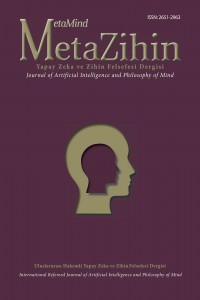Çağdaş Nörobilim ve Dini Tecrübe: Nöroteolojik Tezler Bir Zihinsel Durum Olan Tanrı İnancını Yanlışlayabilir mi?
Öz: Son yıllarda dini tecrübe ve davranışların nöral temelini anlamayı amaçlayan nörolojinin bir alt dalı olan nöroteoloji isimli bir bilim dalı belirdi. Popüler bilim literatüründe ve medyada yaygın olarak nöroteolojik çalışmaların Tanrı inancının rasyonelliğini ortadan kaldırdığı iddiasına rastlamaktayız. Bu makalede çağdaş nörolojinin ortaya koyduğu iddia edilen ve popüler literatürde atıf yapılan bu sonuçları Tanrı inancının rasyonelliği açısından incelemeye çalışacağız. Çağdaş nörolojinin ortaya koyduğu iddia edilen sonuçları üç farklı tezde sınıfladıktan ve Tanrı inancının çıkarımsal ya da çıkarımsal olmayan iki farklı türde olabileceğine dikkat çektikten sonra, bu tezlerin Tanrı inancının rasyonelliğine etkileri incelenecektir. Önce, popüler iddiaların aksine nöroteolojik tezlerin doğaları gereği sadece çıkarımsal olmayan Tanrı inancını eleştirmekte kullanılabilecekleri savunulmaya çalışılacaktır. Makalenin geri kalanında ise çıkarımsal olmayan Tanrı inançlarını eleştirmek için iki alternatif strateji belirlenecek ve bu üç tezin bu stratejiler altında çıkarımsal olmayan Tanrı inancı için çürüten olup olmadığı irdelenecektir.
Anahtar Kelimeler:
Tanrı, Tanrı inancı, nöroteoloji, ateizm, nöroloji
Contemporary Neuroscience and Religious Experience: Can Neurotheological Theses Falsify the Mental State ‘Belief in God’?
Abstract: Nowadays a new branch of neurology called neurotheology, which tries to understand the neural foundations of religious experiences and behavior, emerged. In popular science literature as well as media it is commonly argued that the studies done in neurotheology have diminished the rationality of the belief in God. In this article we will try to evaluate these studies mentioned in popular literature from the perspective of rationality to the belief in God. First, I classify the results of neurotheology in three different theses and then we point that there are two kinds of belief to God: Inferential and non-inferential beliefs in God. Then I argue that contrary to the popular claims, neurotheological results by their nature can be used to criticize just the non-inferential beliefs in God. In the rest of the article I present to strategies to criticize non-inferentials beliefs and I evaluate the possibility of forming defeater to the non-inferential belief in God based on the three neurological theses following the two outlined strategies.
Keywords:
God, belief in God, neurotheology, atheism, neurology,
___
- Alston, William (1991). Perceiving God. Ithaca, NY: Cornell University Press.
- Basinger, David (2015). "Religious Diversity (Pluralism)." Edward N. Zalta (Der.), The Stanford Encyclopedia of Philosophy (Spring 2018 Edition) içinde. Alındığı URL= https://plato.stanford.edu/archives/spr2018/entries/religious-pluralism
- Bergmann, Michael (2001). “Skeptical Theism and Rowe's New Evidential Argument from Evil.” Noûs, 35(2): 278–296).
- Collins, Robin (2012). “The Teleological Argument: An Exploration of the Fine-Tuning of the Cosmos.” W. L. Craig ve J. P. Morel (Der.), The Blackwell Companion to Natural Theology içinde, (s. 202-281). New York: Wiley-Blackwell.
- Craig, William L. (1979). The Kalām Cosmological Argument. London: The Macmillan Press.
- Craig, W. L. ve Morel, J. P. (Der.). (2012). The Blackwell Companion to Natural Theology. New York: Wiley-Blackwell.
- D’ Aquili, E. G. ve Newberg, A. B. (1999). The Mystical Mind: Probing the Biology of Religious Experience. Minneapolis: Fortress Press.
- Dawkins, Richard (2006). The God Delusion. New York: Bantam Books.
- Dennett, Daniel (2007). Breaking the Spell: Religion as a Natural Phenomenon. New York: Penguin Books.
- Dowe, Phil (2005). Galileo, Darwin and Hawking: The Interplay of Science, Reason, and Religion. Grand Rapids, MI: W.B. Eerdmans Pub. Co.
- Granqvist, P. vd. (2005). "Sensed Presence and Mystical Experiences are Predicted by Suggestibility, not by The Application of Transcranial Weak Complex Magnetic Fields." Neuroscience Letters, 379(1): 1-6.
- Griffiths, R. vd. (2006). "Psilocybin Can Occasion Mystical-type Experiences Having Substantial and Sustained Personal Meaning and Spiritual Significance." Psychopharmacology, 187(3): 268-83, discussion: 284-92.
- Griffiths, R. vd. (2008). "Mystical-type Experiences Occasioned by Psilocybin Mediate The Attribution of Personal Meaning and Spiritual Significance 14 Months Later." Journal of Psychopharmacology, 22(6): 621-32.
- Newberg, A., D’Aquili, E. ve Rause, V. (2001). Why God Won’t Go Away: Brain Science and the Biology of Belief. New York: Ballantine Book.
- Oomen, Palmyre (2003). “Neurotheology.” J. Wentzel Vredevan Huyssteen (Der.), Encyclopedia of Science and Religion (2. Baskı) içinde, (s. 617-618). New York: Macmilan.
- Persinger, Michael A. (1983). “Religious and Mystical Experiences as Artifacts of Temporal Lobe Function: A General Hypothesis.” Perceptual and Motor Skills, 57: 1255-1262.
- Persinger, Michael A. (2003). “The Sensed Presence Within Experimental Settings: Implications for The Male and Female Concept of Self.” The Journal of Psychology: Interdisciplinary and Applied, 137(1): 5-16.
- Plantinga, Alvin (2000). Warranted Christian Belief. New York: Oxford University Press.
- Plantinga, A. ve Wolterstorff N. (1983). Faith and Rationality. Notre Dame, Indiana: University of Notre Dame Press.
- Ramachandran, V. S. ve Blakeslee, S. (1998). Phantoms in the Brain: Probing The Mysteries of The Human Mind. New York: William Morrow.
- Russell, Robert J. (2008). “Quantum Physics and the Theology of Non-Interventionist Objective Divine Action.” Philip Clayton (Der.), The Oxford Handbook of Religion and Science içinde, (s. 579–595). New York: Oxford University Press.
- Strassman, Rick (2001). DMT: The Spiritual Molecule. Inner Traditions Bear and Company.
- Swinburne, Richard (2004). The Existence of God. Oxford: Oxford University Press.
- ISSN: 2651-2963
- Yayın Aralığı: Yılda 2 Sayı
- Başlangıç: 2018
- Yayıncı: Murat ARICI
Sayıdaki Diğer Makaleler
Geçmişten Geleceğe Kendiliğe Bir Bakış: Özgünlük, Zaman Ve Özgürlük
Zombiler ve Fenombilere Zihnimizde Yer Açmak
Biyolojik Doğalcılık Ekseninde John Searle ve Zihin-Beden Problemi
Algısal İçerik Kavramsalcılığına Karşı bir Durum: İlk Algı
[Söyleşi] Prof. Dr. Erdinç Sayan ile Söyleşi: Zihnin Doğası Üzerine
